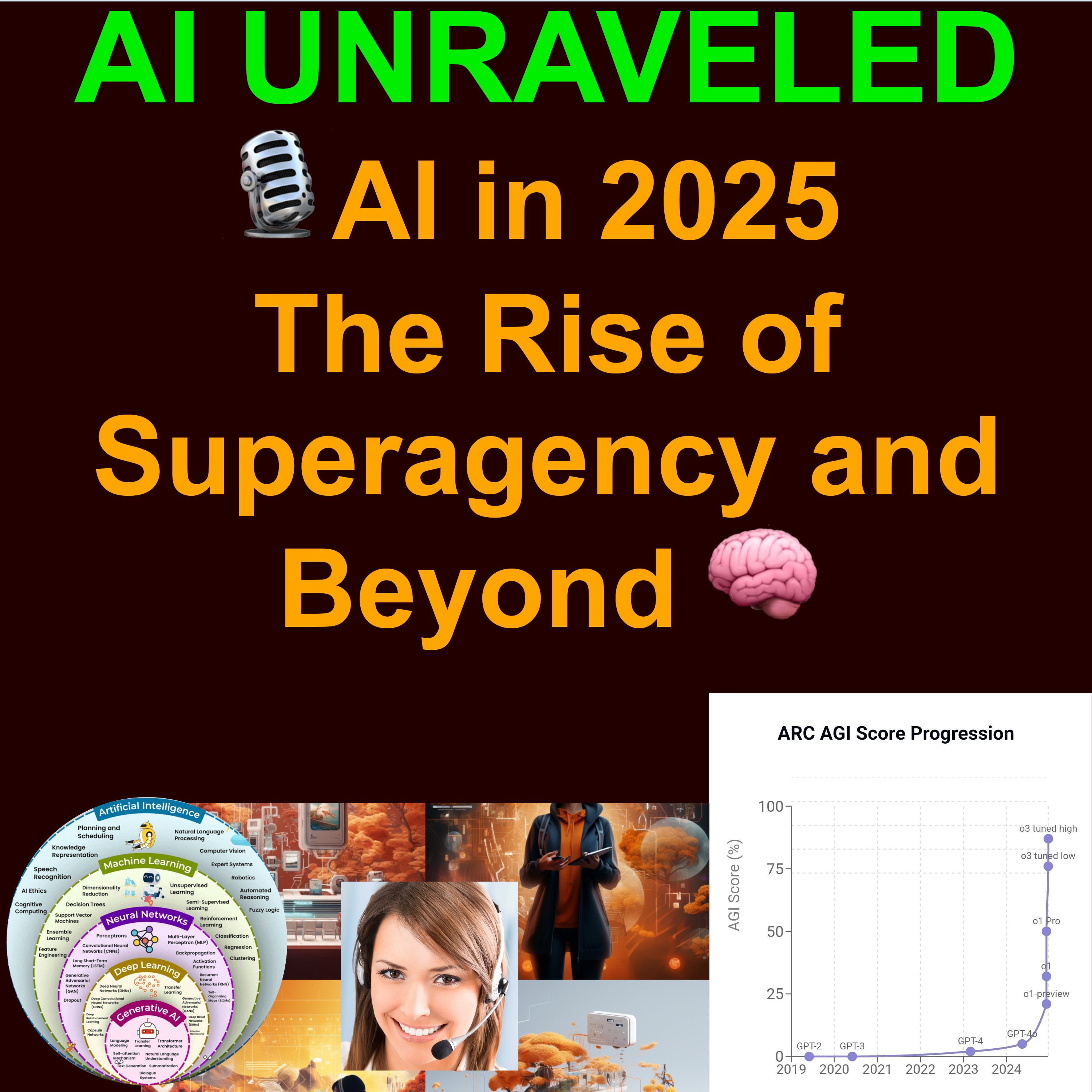
☀️AI in 2025: The Rise of Superagency and Beyond🧠

AI Unraveled: Latest AI News & Trends, GPT, ChatGPT, Gemini, Generative AI, LLMs, Prompting
Deep Dive
What is the concept of 'superagency' in AI as discussed in the podcast?
Superagency refers to a future where individuals have personalized teams of AI assistants, each specialized for specific tasks. These AI agents, powered by large-scale transformer models, will handle a wide range of functions, from managing schedules to providing expert advice in fields like healthcare and logistics.
How will large-scale transformer models contribute to the rise of superagency?
Large-scale transformer models are powerful algorithms capable of processing massive amounts of data and learning to perform diverse tasks. They form the foundation of superagency by enabling AI agents to specialize in areas like language processing, image recognition, and decision-making, making them highly versatile and effective.
What role will big tech and scale tech startups play in the AI landscape by 2025?
Big tech companies will focus on building core AI infrastructure and refining large-scale transformer models, providing the foundational computing power. Scale tech startups, on the other hand, will leverage this infrastructure to innovate in niche areas like healthcare, logistics, robotics, and creative fields, delivering specialized AI solutions.
How will AI impact healthcare professionals by 2025?
AI will assist healthcare professionals by analyzing patient data, suggesting diagnoses, and recommending personalized treatment options. This will free doctors from tedious data analysis, allowing them to focus on patient care and complex decision-making, ultimately improving healthcare outcomes.
What are the potential benefits of AI in scientific discovery?
AI is expected to revolutionize scientific discovery by analyzing vast genetic datasets, identifying patterns humans might miss, and accelerating breakthroughs in genomics and drug development. This could lead to cures for rare diseases and transform fields like genomics and personalized medicine.
How will AI improve reliability and reduce errors by 2025?
AI agents in 2025 will have enhanced memory and context understanding, allowing them to remember past interactions and user preferences. This will lead to fewer errors, more personalized results, and more natural interactions. Improved calibration will also reduce instances of AI hallucinations, ensuring outputs are grounded in data and reasoning.
What are the risks of job displacement due to AI advancements?
As AI becomes more capable, jobs involving repetitive or easily automated tasks may become obsolete. To mitigate this, individuals need to focus on developing uniquely human skills like critical thinking, creativity, and emotional intelligence, which AI cannot replicate. Lifelong learning and adaptability will be crucial in the evolving job market.
What ethical concerns are associated with AI development?
Key ethical concerns include bias in algorithms, potential misuse of AI, and ensuring fairness, transparency, and accountability in AI systems. Responsible AI development requires collaboration among policymakers, technologists, ethicists, and the public to align AI with human values and promote equitable outcomes.
How can individuals prepare for an AI-driven future?
Individuals can prepare by demystifying AI, engaging in hands-on learning through online courses and tools, and identifying how AI can address specific pain points in their work or life. Staying informed about AI advancements and understanding its broader societal impact are also essential steps.
What is the importance of uniquely human skills in an AI-driven world?
Uniquely human skills like creativity, emotional intelligence, critical thinking, and collaboration will become increasingly valuable as AI handles data-heavy tasks. These skills set humans apart from AI and will be essential for roles that require nuanced decision-making, ethical judgment, and interpersonal connections.
- Large-scale transformer models are the brains behind AI agents.
- Big tech will focus on core AI infrastructure.
- Scale tech startups will develop specialized AI solutions for niche areas.
Shownotes Transcript
☀️Predictions for 2025: The Rise of Superagency and Beyond🧠
☀️AI Predictions in 2025: The Rise of Superagency and Beyond
🎵Listen at https://podcasts.apple.com/ca/podcast/ai-unraveled-latest-ai-news-trends-chatgpt-gemini-gen/id1684415169)
AI and Machine Learning For Dummies: Your Comprehensive ML & AI Learning Hub [Learn and Master AI and Machine Learning from your iPhone) ]
Discover the ultimate resource for mastering Machine Learning and Artificial Intelligence with the "AI and Machine Learning For Dummies" app.
iOs: https://apps.apple.com/ca/app/machine-learning-for-dummies/id1611593573)
PRO Version (No ADS, See All Answers, Practice Tons of AI Simulations, Plenty of AI Concept Maps, Pass AI Certifications): https://apps.apple.com/ca/app/machine-learning-for-dummies-p/id1610947211)
What you can do with this App:
- 🚀 Learn AI interactively! Tweak models, code exercises, visualize concepts, & tackle projects. Perfect for beginners to master AI/ML easily.
- 🎓 AI & ML made easy! Hands-on coding, visual tools, and real-world examples. Engage with fun, interactive learning & community support.
- 🤖 Master AI step-by-step! Practice coding, explore simulations, & see real-time changes. Fun, interactive tools simplify complex AI concepts.
- 🌟 AI learning simplified! Interactive models, coding challenges, flashcards & real-world projects. Visualize & build your own AI models.
- 💡 Explore AI with real-time simulations! Watch neural networks in action & learn by tweaking parameters. Coding & visual tools make it easy.
- 📚 Learn AI the hands-on way! Code exercises, visual tools, & interactive simulations. Fun, engaging, and perfect for all skill levels.
- 🏆 Interactive AI education! Tackle coding, visual tools, real-world projects, & fun challenges. Earn badges & climb the leaderboard.
- 🔍 See AI in action! Tweak parameters & watch real-time effects. Coding & visual tools make learning neural networks & ML concepts easy.
- 🧠 Your AI guide! Visualize, code, & build models with interactive tools. Learn at your pace & join a supportive community.
- 🎓 Hands-on AI learning! Practice coding, see concepts visually, and learn through real-world projects. Fun, engaging, and easy to follow.